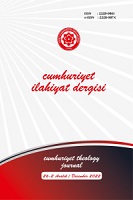Şâtıbî’nin (öl. 590/1194) Ḥırzü’l-emânî’de (eş-Şâṭıbiyye) Tażʻîf Ettiği Vecihler ve Bu Vecihlerin Günümüz Kıraat Tedrisatı Pratiğine Yansıması
The Wujooh Lightened by S̲h̲āṭibī (d.590/1194) in Ḥirz al-amānī (al-Shāṭibiyya) and Reflection of These Wujooh on Today’s Recitation Practice
Author(s): Abdulhalim BaşalSubject(s): Cultural history, 6th to 12th Centuries, History of Islam, Theory of Literature, Sociology of Religion, Sociology of Literature
Published by: Cumhuriyet Üniversitesi İlahyat Fakültesi
Keywords: Recitation; S̲h̲āṭibī; Ḥirz al-amānī (al-Shāṭibiyya); Wajh; Lighten; Commentator;
Summary/Abstract: Abū Muḥammad al-Qāsim b. Farruḥ al-S̲h̲āṭibī (d.590/1194) took his place in history as one of the most distinguished recitation scholars who emerged from the al-Andalus Islamic civilization. S̲h̲āṭibī left al-Andalus and settled in Cairo due to some political pressure he faced in the later phases of his life. In addition to the dozens of students he trained, he authored many works in the field of recitation and has become one of the authority figures in the science of recitation with his works. His poems, especially those he composed based on the works of Abū ʿAmr al-Dānī, another recitation scholar who is from al-Andalus, were considered reference works in terms of recitation science both in the periods when they were written and in later times. S̲h̲āṭibī’s work in this respect, and perhaps the most complimented one is Ḥirz al-amānī wa wajh al-tahānī in which he poetizes Dānī’s work called al-Taysīr fi ’l-qirāʾāt al-sabʿ which contains the differences among seven recitations. It was written to memorize the differences among the seven qirāʾāt (al-qirāʾāt al-sabʿa) easily and has been one of the primary sources of recitation teaching from history to the present. This article deals with the determination of some aspects that S̲h̲āṭibī considers weak in his poetic work Ḥirz al-amānī and their situation in the practice of recitation education. It is understood that S̲h̲āṭibī defined these aspects openly, occasionally with expressions such as not being credible and not being reliable, and occasionally indirectly with expressions such as inconsistent and unstable. It is seen that there are eight of these wujooh in total, two of which are about pronunciation differences and six of which are about farshī differences. In this respect, the article primarily deals with the wujooh with a dual classification as pronunciation differences and farshī differences, as is often observed in classical works written for the variances in recitation. Then, on the one hand, how these aspects were processed by the important scholars of the field of recitation, such as Ibn Mujāhid (d. 324/936), Makkī b. Abū Ṭālib (d.437/1045), Abū ʿAmr al-Dānī and Ibn al-Jazarī (d.833/1429) and on the other hand, the interpretation of Ḥirz al-amānī by its commentators has been conveyed. Considering numerous commentaries on this poem and the volume of the article, not all the commentaries mentioned at this point were consulted, and the most reliable commentaries among them were taken as the basis. To clearly reflect the situations of these aspects both in the past and in the modern period, attention has been paid to the fact that some consist of classical commentaries, and some belong to the modern period. According to this, ʿAlam al-Dīn al-Sakhāwī’s (d.643/1245) Fatḥ al-wasīṭ, Abū S̲h̲āma al-Maqdisī’s (d.665/1267) Ibrāz al-maʿānī and Abū Isḥāq al-Jaʿbarī’s (d.732/1332) Kanz al-maʿānī are the classical commentaries of the article; ʿAlī Muḥammad al-Ḍabbāʿs (d. 1380/1961) Irshād al-murīd, and ʿAbd al-Fattāḥ al-Qāḍī’s (d.1403/1982) al-Wāfī are the commentaries of the modern period. Lastly, the article tries to reveal the situation of these aspects in the practice of recitation teaching activities carried out in Turkiye and the Arab world. Within the framework of all these examinations, it has been seen that S̲h̲āṭibī did not only content himself with the narrations that reached him in his work, but also passed these narrations through a sound filter and made evaluations about them. In this respect, it has been concluded that he hit the mark in his analysis of the relevant aspects. Because, it has been observed that these aspects, which S̲h̲āṭibī points out to be light, are not taught in both classical and modern recitation teaching activities, and these aspects are not included in the teaching of recitation. Besides the encountering of the competent personalities of the recitation field with the authentic aspects despite being described by S̲h̲āṭibī has been interpreted as showing the importance of the oral transfer method in the tradition of recitation teaching. On the other hand, it has been concluded that most of the aspects that S̲h̲āṭibī defines as weak are composed of recitations through Ibn al-Zakwān, but that there is no specific reason to explain this situation and that it is accepted as just a coincidence. Though it is evidently understood that the vast majority of these aspects, which are defined as light by S̲h̲āṭibī, are not taught in the recitation teaching activities carried out currently, it is possible to say that they can still be included in the teaching of the teaching of recitation variances. Because it has been found that the related aspects are described in some other works that contain the differences in recitation. From this point of view, it can be said that there is a belief that teachers who are engaged in different reading teaching between recitations can have their students read these aspects. However, it has been understood that it would be a more appropriate action to make these aspects based only on personal preferences, not attributing them to Ḥirz al-amānī.
Journal: Cumhuriyet İlahiyat Dergisi
- Issue Year: 26/2022
- Issue No: 2
- Page Range: 699-716
- Page Count: 18
- Language: Turkish

